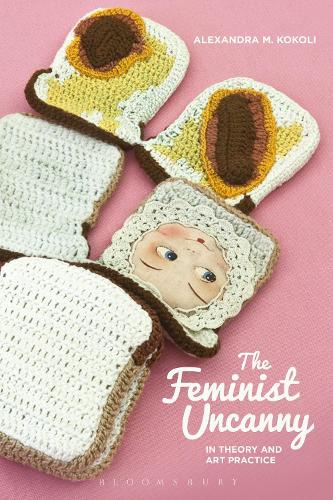
The Feminist Uncanny in Theory and Art Practice
(Paperback)
Available Formats
Publishing Details
The Feminist Uncanny in Theory and Art Practice
By (Author) Alexandra M. Kokoli
Bloomsbury Publishing PLC
Bloomsbury Academic
30th November 2017
United Kingdom
Classifications
Tertiary Education
Non Fiction
Feminism and feminist theory
Theory of art
Psychoanalytical and Freudian psychology
701
Physical Properties
Paperback
560
Width 156mm, Height 234mm
340g
Description
The Feminist Uncanny in Theory and Art Practice investigates the widely debated, deeply flawed yet influential concept of the uncanny through the lens of feminist theory and contemporary art practice. Not merely a subversive strategy but a cipher of the fraught but fertile dialogue between feminism and psychoanalysis, the uncanny makes an ideal vehicle for an arrangement marked by ambivalence and acts as a constant reminder that feminism and psychoanalysis are never quite at home with one another. The Feminist Uncanny begins by charting the uncanniness of femininity in foundational psychoanalytic texts by Ernst Jentsch, Sigmund Freud, Jacques Lacan and Mladen Dolar, and contextually introduces a range of feminist responses and appropriations by Hlne Cixous, Julia Kristeva and Sarah Kofman, among others. The book also offers thematically organised interpretations of famous artworks and practices informed by feminism, including Judy Chicagos Dinner Party, Faith Ringgolds story quilts and Susan Hillers paraconceptualism, as well as less well-known practice, such as the Womens Postal Art Even (Feministo) and the photomontages of Maud Sulter. Dead (lexicalised) metaphors, unhomely domesticity, identity and (dis)identification, and the tension between family stories and art's histories are examined in and from the perspective of different artistic and critical practices, illustrating different aspects of the feminist uncanny. Through a partisan yet comprehensive critical review of the fascinating concept of the uncanny, The Feminist Uncanny in Theory and Art Practice proposes a new concept, the feminist uncanny, which it upholds as one of the most enduring legacies of the Women's Liberation Movement in contemporary art theory and practice.
Reviews
A powerful feminist critique of not only the home, but a number of borders and boundaries. -- Oxford Art Journal
The Feminist Uncanny in Theory and Art Practice provides a much needed remedy of the Freudian uncanny for a feminist art history. Kokolis intertextual coupling of woman and the unhomely unhinges the uncanny from castration and propagates it in a novel series of domestic spheres in work by women artists and collectives. Whether in the postal art of Feministo or the paraconceptualism of Susan Hiller, Kokolis feminist uncanny transforms homelessness into a home which is strange, subversive and revels in its ambivalence. The Feminist Uncanny in Theory and Art Practice is set to become a core curriculum text. -- Maria Walsh, Senior Lecturer in Art History and Theory, University of the Arts London, UK
This book is an essential reading for anyone interested in the productive yet troubling collaboration and contradictions between feminism and the theoretical apparatus of psychoanalysis. Kokoli proposes the feminist uncanny as the site of this critical encounter, exploring the multiple definitions of the concept and offering new readings of prominent feminist artworks as well as less well known projects. -- Mo Throp, Researcher and PhD Supervisor, University of the Arts London, UK
In The Feminist Uncanny, Alexandra Kokoli brings the psychoanalytic and political registers of domestic space into tension through a new dialogue of the uncanny with feminist artistic practices. Offering the reader deeper insights into the unsettling nature inherent in such practices of resistance and liberation, Kokoli makes an important original contribution to contemporary feminist scholarship. -- August Jordan Davis, Senior Research Fellow, University of Southampton, UK
In this fascinating book, Alexandra Kokoli pursues the thread of the uncanny, taking it from Freud through interlocking and mutually interrogating layers of theory, to reveal its potential in feminist fine art. The heterogeneous range of art work engaged with enables Kokoli to expose and examine the broader, subversive significance of the feminist uncanny, opening up an innovative, unsettling and rewarding approach to feminist fine art practices. -- Sue Tate, Research Fellow, University of the West of England and Freelance Art Historian, UK
Alexandra Kokolis The Feminist Uncanny is a smart and engaging re-evaluation of the long-standing troubled relationship between feminism and psychoanalysis, and its complex manifestation in feminist art practice. Kokoli not only offers a series of deft analyses of the diverse provocations made by this genealogy but, focusing on the marginal yet powerful spaces of femininity within culture, rethinks the feminist calling card that the personal is political. -- Joanne Morra, Reader in Art History and Theory, University of the Arts London, UK
Author Bio
Contact Biography 59 Alexandra M. Kokoli is Senior Lecturer in Visual Culture Fine Art at Middlesex University, and Research Associate at the Visual Identities in Art and Design (VIAD) Research Centre, University of Johannesburg. She is the editor of Feminism Reframed: Reflections on Art and Difference (2008) and Susan Hiller, The Provisional Texture of Reality: Selected Talks and Texts, 1977-2007 (2008).
